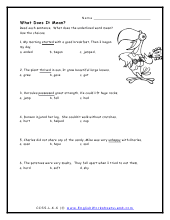Conversational Vocabulary Words Worksheets To Print:
Above | Below – We work on positional words through the use of pictures.
Matching Game – Descriptive words are used to identify objects.
Feeling Words – We begin to understand the concept of the words "frustrated" and "confused".
Down on the Farm – The words you are looking for are all related to working on a farm.
Look Who's Talking! – What does the cat, chicken, and cow say?
A Job that's out of This World – Astronaut really does look good on a job resume.
Underline The Same Meanings – Circle the word in the second sentence that means almost the same as the underlined word.
Imagine! – When you imagine something, you picture it in your head. Sometimes people imagine things that don't really exist in the world, and then describe them or draw them.
Strong | Weak – In each set of pictures below, one figure is strong and one figure is weak.
Scuba Diving – Scuba diving is swimming underwater using special equipment that helps you to breathe.
What's Your Job? – Read each sentence. Look at the picture clues and fill in the missing word.
Together – Color each picture that shows what it means to be together.
Common Phrases – Match the common phrase on the left with its meaning on the right.
Do You Know What It Means? – Circle the correct meaning for each phrase below.
Matching Game 2 – Match the words and phrases that go together.
The Miserable Day – 4 people are having a miserable day. The rest of the people are having a happy day. Circle the people that are having a miserable day.
What Does It Mean? – Read each sentence. What does the underlined word mean?
Get FREE English Worksheets In Your Email

